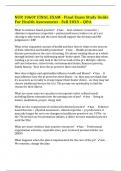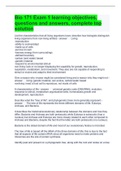Exam (elaborations)
NUR 1060C FINAL EXAM - Final Exam Study Guide For Health Assessment - Fall 2023 – Q&A
- Course
- Physical Assessment
- Institution
- Physical Assessment
NUR 1060C FINAL EXAM - Final Exam Study Guide For Health Assessment - Fall 2023 – Q&A
[Show more]




